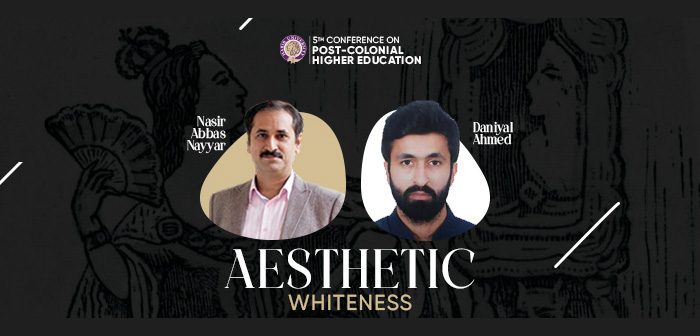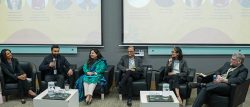The third session of the Fifth Post-Colonial Higher Education Conference was titled, ‘Aesthetic Whiteness’ which featured Associate Professor at Institute of Urdu Language and Literature at Punjab University, Nasir Abbas Nayyar, and Lecturer, Comparative Humanities at Habib University, Daniyal Ahmed as panelists. Dr. Nauman Naqvi, Conference Chair, was moderator of the session.
The speakers stated that the roots of white nationalism are much deeper than we think, and this prevails not only in the West but also in Third World countries as well. The future of the entire planet is threatened by this dilemma.
Professor Nayyar said that unfortunately, less has been said and written on this subject. It has not been studied enough how racist attitudes have permeated literature and become a part of our identity.
“Whiteness pervades every area of our lives. A small example of this is that white skin is considered to be a symbol of beauty in our country. Capitalist institutions take advantage of this,” he stated.
He said that there are also influences of white supremacy on Urdu literature. Indians were called natives (local) and a separate identity category was created for them. The whiteness was different from European identity in every way. In the colonial context, a native is a stranger on its own soil, cut off from their true identity and alienated from their origin. He is deprived of the right to live with dignity.
In the white man’s world, he needs validation to work. White racism is not just about arrogance, prejudice, nor political strategy anymore; it has extended to our real, physical, mental, scientific and imaginative worlds.
According to Professor Nayyar Abbas, the first of the basic principles of whiteness theory is that it considers power as its right. Second, they possess all ‘superior’ human qualities because they have power. They are high-minded, true, civilized and true benefactors of the common people and they possess the divine right to rule over the lower nations.
He went on to say that the colonial power, under the guise of racism and establishment of economic monarchy, also offered various interpretations to find its moral justification.
According to Daniyal Ahmed, “today’s youth tends to learn guitar and other instruments of Western music rather than instruments of classical music.” He stated that, for a long time in the Western world, Eastern music was considered merely a noise and it was believed that there was no science or thought behind it. However, over time, that is now changing and white people are becoming more interested in our music.
On the other hand, Pakistani music competitions have very few people who sing and listen to classical music and it has more of a Western aesthetic. Despite the effective power and strength of traditional music, many musical instruments invented in Europe, such as the harmonium, have been adopted. Through an example, he pointed out that the heritage that protects our heritage is now considered abusive in our country – all this has occurred after the colonial era.
Ahmed argued that we have given place to Western composers in our music which has prompted us to view our own musical instruments and composers with our own lens. Furthermore, the link between capitalism, colonialism and globalization has also influenced music.
The speakers of the session said that the ethnic classification established by the government in the colonial era is still embedded in the global system. Addressing the speakers and audience, Dr. Nauman Naqvi said that black thinkers, in particular, as well as others say that modern times and systems are in fact ethnic. Racism and capitalism are intertwined and inseparable. Its effects are also present in the culture. This fact has caused irreparable damage to European and Western culture itself.




